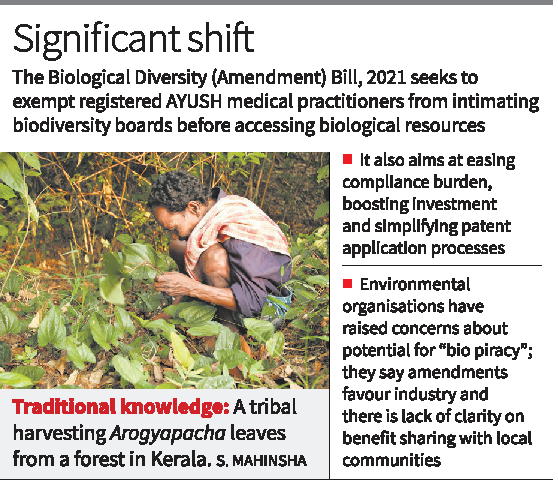Description

Disclaimer: Copyright infringement not intended.
Context
- The Lok Sabha recently passed the Biological Diversity (Amendment) Bill, 2021, which seeks to amend the existing Biological Diversity Act, 2002.
- The bill aims to address certain issues and concerns related to the Act and promote the benefits of medicinal forest products to tribes and vulnerable communities.
Details
Objectives of the Bill
- Benefitting Tribes and Vulnerable Communities: The main objective of the amendment is to ensure that tribes and vulnerable communities derive benefits from the proceeds of medicinal forest products.
- Encouraging Ayurveda and Ease of Doing Business: The amendment decriminalizes certain activities, encouraging the practice of Ayurveda and promoting ease of doing business in the Ayurveda sector.
- Simplifying Patent Application Processes: The amendment aims to simplify patent application processes for traditional Indian medicine practitioners, researchers, and industry players, facilitating collaborative research and investments.
- Widening Scope of Access and Benefit Sharing: The bill also proposes to widen the scope of levying access and benefit-sharing with local communities to further conserve biological resources.
Environmental Concerns
- Exemption for AYUSH Practitioners: The exemption of registered AYUSH medical practitioners from intimating biodiversity boards before accessing biological resources has raised concerns among environmentalist organizations. They fear it might pave the way for "bio-piracy" and favor the AYUSH Ministry.
- Lack of Clarity on Benefit Sharing: Some environmental organizations argue that the amendments favor industry players, and there is a lack of clarity regarding benefit-sharing with local communities.
- Decriminalization of Offences: The bill decriminalizes certain offences under the Act and substitutes them with monetary penalties. Environmentalists worry this might lead to lesser deterrence against illegal activities related to biodiversity.
Implementation Issues
- Lack of Data on Benefit-Sharing: The implementation of the Biological Diversity Act, 2002, has faced challenges in documenting the money received from companies and traders for access and benefit-sharing from traditional knowledge and resources. There is a lack of data on whether companies have fulfilled their commitments to pay communities.
- Abuse of Exemptions: Critics argue that the exemptions provided in the amendment could open the law to potential abuse and exploitation, necessitating stricter regulations.

Biological Diversity Act, 2002
- The Biological Diversity Act, 2002, is an important legislation enacted by the Indian government to conserve and promote the sustainable use of biological diversity.
- It was formulated to give effect to the United Nations Convention on Biological Diversity (CBD), 1992, which aims to ensure the conservation of biological diversity, the sustainable use of its components, and the fair and equitable sharing of benefits arising from the utilization of biological resources and associated traditional knowledge.
Key Features of the Act
- Three-Tier Structure: The Act establishes a three-tier structure consisting of a National Biodiversity Authority (NBA) at the national level, State Biodiversity Boards (SBBs) at the state level, and Biodiversity Management Committees (BMCs) at the local body level. Each tier plays a crucial role in the conservation and sustainable use of biological diversity.
- People's Biodiversity Registers (PBRs): One of the primary responsibilities of the BMCs is to document local biodiversity and associated knowledge in the form of PBRs. These registers serve as valuable repositories of traditional knowledge and resources related to biodiversity.
- Access and Benefit-Sharing (ABS): The Act recognizes the rights of local communities to access biological resources and share the benefits arising from their use. It aims to ensure that local communities are involved in the decision-making process and receive fair and equitable benefits from the commercial utilization of biological resources.
- Conservation of Biological Diversity: The Act emphasizes the conservation of biological diversity, including its components, habitats, and ecosystems. It provides measures to protect endangered species and habitats to ensure their sustainable use.
- Regulation of Exports: The Act empowers the NBA to regulate the export of biological resources and associated traditional knowledge to prevent their unauthorized and exploitative use.
- Prior Informed Consent: The Act requires obtaining prior informed consent from the local communities or BMCs before accessing biological resources for research or commercial purposes.
- Bio-Safety Measures: The Act includes provisions related to bio-safety measures, including the safe handling and use of genetically modified organisms (GMOs).
- Offences and Penalties: The Act specifies various offences related to biodiversity conservation and imposes penalties for violations. It seeks to deter illegal activities that may harm biological diversity.
Implementation and Challenges
While the Biological Diversity Act, 2002, is a crucial legal framework for biodiversity conservation, its effective implementation has faced challenges. Some of the key challenges include:
- Awareness and Capacity Building: Lack of awareness among local communities and stakeholders about their rights and responsibilities under the Act has hindered its effective implementation. Capacity building and sensitization programs are essential to empower stakeholders and promote active participation.
- Resource Constraints: Inadequate financial and human resources at the national, state, and local levels have affected the implementation of the Act. Adequate funding and support are required to carry out conservation and management activities effectively.
- Coordination among Authorities: The three-tier structure of NBA, SBBs, and BMCs requires effective coordination and collaboration among the authorities for seamless implementation. Strengthening institutional mechanisms is vital for better coordination.
- Bio-Piracy and Benefit-Sharing: Ensuring fair and equitable benefit-sharing with local communities is crucial to prevent bio-piracy and exploitation of traditional knowledge. Establishing clear guidelines for benefit-sharing mechanisms is essential.

Conclusion
The Biological Diversity (Amendment) Bill, 2021, aims to address concerns related to the existing Act and promote the benefits of medicinal forest products to tribes and vulnerable communities. While the government states that the amendment will encourage Ayurveda and ease of doing business, environmentalists raise concerns about the potential for "bio-piracy" and lack of clarity on benefit-sharing. Striking a balance between promoting traditional knowledge and protecting biodiversity will be crucial for the effective implementation of the amendment.
|
PRACTICE QUESTION
Q. Assess the implications of the Biological Diversity (Amendment) Bill, 2021, on the conservation of biodiversity and traditional knowledge. Evaluate the government's rationale behind the amendments and propose strategies to ensure effective implementation while safeguarding the interests of tribes, vulnerable communities, and the environment. (250 Words)
|
https://epaper.thehindu.com/ccidist-ws/th/th_delhi/issues/45125/OPS/GR0BHGSOJ.1+GBCBHHQ51.1.html











